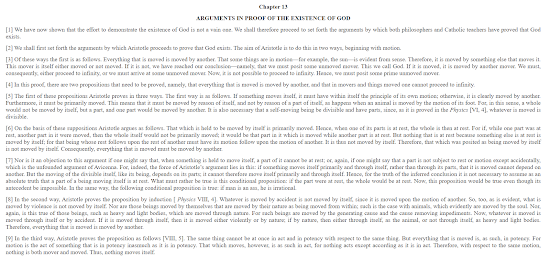Response to YouTube video "Every Argument for God DEBUNKED!" - A Few Personal Thoughts
Response to "Rationality Rules" video "Every Argument for God DEBUNKED!"
He mentions the Contingency argument, seemingly referring to Aquinas' Second way from causality. The gaping equivocation that he falls into is when he puts forward causality as a type of temporal causality. In Summa Contra Gentiles Book One, Article 13, Thomas expands on his shorter writing in the the Summa Theologiae Prima Pars, Question II, Article III, and helps expound it in more depth, showing how much he drew upon Aristotle's argument in The Metaphysics.
Aquinas, drawing from Aristotle's notion that the universe was everlastingly unfolding, assumes that the universe is temporally everlasting also. And yet at the same time he also argues for creation ex-nihilo, and for God as a necessary first cause. How? This is because Thomas is making an argument from efficient causality, not temporal causality. In the temporal everlasting chain of causes one is going to have every iteration happen eventually. This means that at some point everything will cease to exist, or at least the form it is currently in it will break down. The question becomes, how do we have the existence of entities that we have right now - the laws of physics, low entropy, living things - ?
This is where the distinction between temporal and formal causation is important. Formal causation is to reveal the dependence in being of things abstracted from time. We can look at Aristotle's formulation in The Metaphysics to help make sense of this. Of course Aristotle's cosmology is a bit dated, but the principle is the same nevertheless. Living things are generated by the workings of nature. Nature itself is a complex entity which is generated through the four elements of the earth being spun by the celestial bodies. The celestial bodies circle and turn the earth through movers which are even more perfect then themselves, the physically unmoved movers (they don't have material bodies). The multitude of physical unmoved movers must be moved by something more perfect themselves, something not moved either physically or immaterially. This is most perfect Unmoved Mover, responsible for the motion and generation of all the rest not by acting, but by drawing all the others into motion through their desire for the perfection of the One.
So one can create a chain of formal dependence in being, regardless of temporal causality. It is in this sense that Thomas calls God the First Cause. It is the necessary and only conclusion to explain the set of facts. Now he mentions that we could just posit the universe as explanatory and it's logically simpler than positing God. This is literally to miss the entire point of Aquinas' and Aristotle's arguments. We are engaged in this type of search precisely because the universe's fundamental characteristics of motion, change, act-potency, and causality are inadequate as explanations.
Also, maybe you're thinking that Aristotle's use of the terms "celestial bodies," and "[physically] unmoved movers" invalidates his argument. But one can substitute them for the language of today and the argument is the same. For example, the earth is moved by other stars and planets, who themselves are generated through the immaterial laws of physics, which themselves remain moving the physical world as a constant, or law, only because there must be something even more fundamental than them keeping them consistent. For example, you can see this reflected in interpretations of Quantum Mechanics, where the most fundamental reality is a mathematical potentiality equation. What is most real is that which is most unified and abstracted from material reality. When one simply takes this trend to its logical conclusion, you end up with a entity of purely immaterial actuality.
Now, the speaker also mentions Hume's objection to universal laws through inductive experience. He is right, sometimes there are new sets of evidence that overthrow what seemed to be universal truths in the past. Nevertheless, causality is something so universal and fundamental, that one cannot deny it without denying the intelligibility of the entire universe. If the universe has no causal intelligibility then science would not be possible as a discipline. So one can choose to take this interpretation of reality, but it would actually lead them to a reductio-ad-absurdam because then they could not even trust that their own thoughts and concepts had a consistent meaning. Whether we realize it or not, everything depends on the Principle of Sufficient Reason and causality. Aristotle even called out people who held this view in The Metaphysics. He tells them that if they were truly metaphysical skeptics, then they should act like a vegetable. They should not talk or act because as soon as they do, they act with a certainty that the world is intelligible.







Comments
Post a Comment